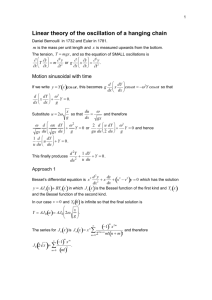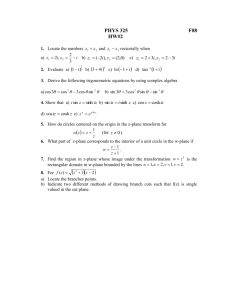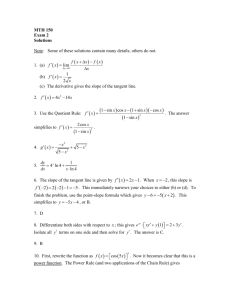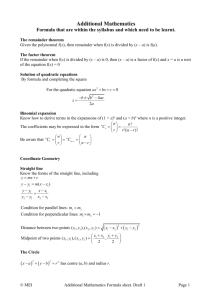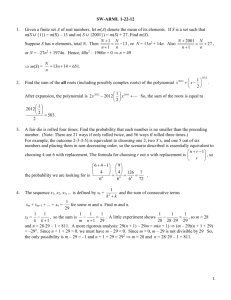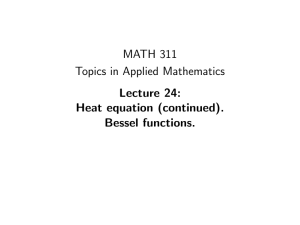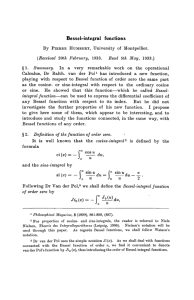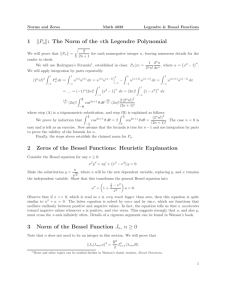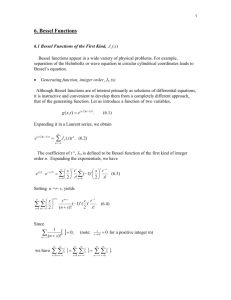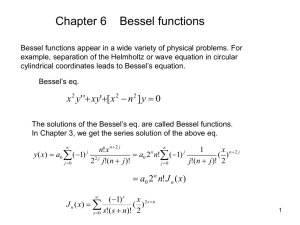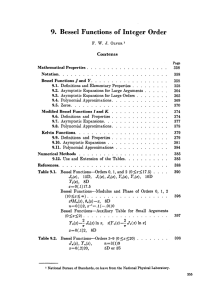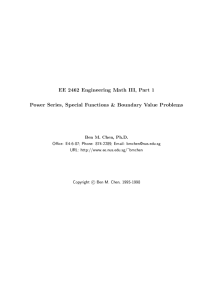samples - Homework Tutoring
advertisement
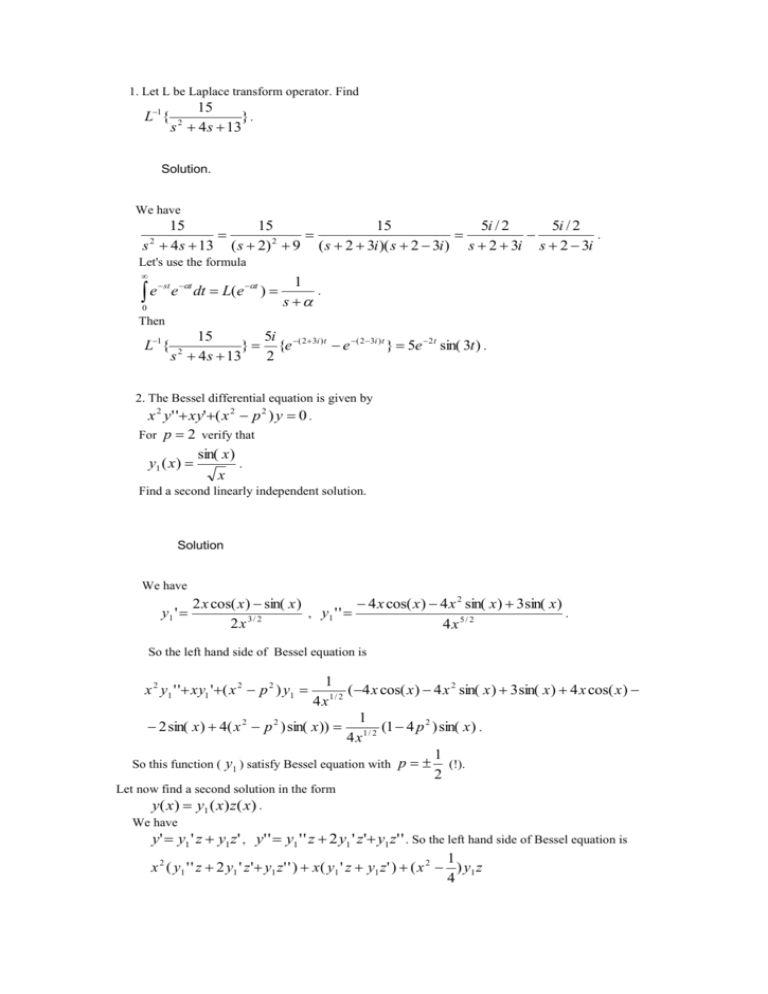
1. Let L be Laplace transform operator. Find
L1{
15
}.
s 4 s 13
2
Solution.
We have
15
15
15
5i / 2
5i / 2
.
2
s 4 s 13 ( s 2) 9 ( s 2 3i )( s 2 3i ) s 2 3i s 2 3i
2
Let's use the formula
e
st t
e dt L(e t )
0
1
.
s
Then
L1{
15
5i
} {e ( 23i ) t e ( 23i ) t } 5e 2 t sin( 3t ) .
2
s 4 s 13
2
2. The Bessel differential equation is given by
x 2 y' ' xy'( x 2 p 2 ) y 0 .
For p 2 verify that
sin( x )
.
y1 ( x )
x
Find a second linearly independent solution.
Solution
We have
y1 '
2 x cos( x ) sin( x )
4 x cos( x ) 4 x 2 sin( x ) 3sin( x )
,
.
y
'
'
1
2x 3/ 2
4x5/ 2
So the left hand side of Bessel equation is
1
( 4 x cos( x ) 4 x 2 sin( x ) 3sin( x ) 4 x cos( x )
1/ 2
4x
1
2 sin( x ) 4( x 2 p 2 ) sin( x )) 1 / 2 (1 4 p 2 ) sin( x ) .
4x
1
So this function ( y1 ) satisfy Bessel equation with p (!).
2
x 2 y1 ' ' xy1 '( x 2 p 2 ) y1
Let now find a second solution in the form
y( x) y1 ( x) z( x) .
We have
y' y1 ' z y1 z' , y' ' y1 ' ' z 2 y1 ' z' y1 z' ' . So the left hand side of Bessel equation is
1
x 2 ( y1 ' ' z 2 y1 ' z ' y1 z ' ' ) x ( y1 ' z y1 z ' ) ( x 2 ) y1 z
4
1
z ( x 2 y1 ' ' xy1 '( x 2 ) y1 ) x 2 y1 z ' '( 2 x 2 y1 ' xy1 ) z '
4
2
2
x y1 z' '(2 x y1 ' xy1 ) z' x 3 / 2 (sin( x) z' '2 cos( x ) z' ) .
It is sufficient to find a partial solution of an equation
sin( x ) z ' '2 cos( x ) z ' 0 .
We can take for instance
z
cos( x )
. Then we have a second solution of Bessel equation
sin( x )
cos( x )
.
x1/ 2
y2 ( x)
3. Ten engineering schools in the US were surveyed. A sample contained 250 electrical engineers, 80
of which were women; 175 chemical engineers, 40 of which were women. Compute the 90%
confidence interval for the difference between the proportion of women in these two fields of
engineering. Is the difference significant?
Solution.
80
40
0.32 , p 2^
0.22857 . Further (this is an approximation)
250
175
0.32 0.68
0.22857 0.77143
p1^ N ( p1 ,
) , p2^ N ( p2 ,
) and
250
175
We have p1
^
p1^ p 2^ N ( p1 p 2 , 0.00087 0.00101) . So we receive the 90%-confidence interval (the
table value is 1.645)
0.09143 0.0713 for p1 p2 and this difference is significant.
4. Two components of a microcomputer have the following pdf for their useful lifetimes X and Y:
f ( x, y ) xe x (1 y ) for x 0 , y 0 . Otherwise zero.
What is the probability that the lifetime X of the first component exceeds 3?
What are the marginal pdf's of X and Y? Are the two lifetimes independent?
What is the probability that the lifetime of at least one component exceeds 3?
Solution.
Let's find pdf for X (x>0):
f ( x ) xe x (1 y ) dy xe x ( x 1e xy ) |0 e x .
0
Analogously pdf for Y (y>0):
z z dz
1
.
e
2
1
y
1
y
(
1
y
)
0
g ( y ) xe x (1 y ) dx ( z x(1 y ))
0
Now
P( X 3) e x dx e 3 0.049787 .
3
Obviously X and Y are dependent: joint pdf is not a product of marginal pdf's.
Let's find
3
3
P(max( X , Y ) 3) 1 P(max( X , Y ) 3) 1 xe ( e xy dy )dx
0
x
0
3
1 e x (1 e 3 x )dx e 3 (1 e 12 ) / 4 0.049787 0.249998 0.299785 .
0
5. Verify that
y x n J n (x )
is a particular solution of
xy' '(1 2n ) y ' xy 0 , x 0 .
Solution.
Bessel function
J n (x ) is (by definition) a solution of
1
n2
u' ' u'(1 2 )u 0 .
x
x
n
We can take u x y and substitute this u into the previous equation. We receive
1
n2
LeftHandSide n(n 1) x n 2 y 2nx n 1 y ' x n y ' ' (nx n 1 y x n y ' ) (1 2 ) x n y
x
x
n
n 1
n
n 1
= x y (2n 1) x y ' x y ' ' x ( xy (2n 1) y ' xy' ' ) . So
xy ( 2n 1) y ' xy' ' 0 qed.
6. Show that
E[( X a ) 2 ] is minimized at a E[ X ] .
Solution.
E[( X a ) 2 ] E[(( X E[ X ]) ( E[ X ] a )) 2 ] E[( X E[ X ]) 2 ] ( E[ X ] a ) 2
2( E[ X ] a ) E[ X E[ X ]] E[( X E[ X ]) 2 ] ( E[ X ] a ) 2 E[( X E[ X ]) 2 ] .
7. Use the results from Chapter 8 to prove that
U (148) U (190) . Chapter 8 was over external direct products.
Solution.
U (n ) is the multiplicative group of all invertible elements of the ring
Let n have a decomposition on prime factors:
n p1k1 ... prkr .
Z n Z / nZ .
The general result is
U (n) U ( p1k1 ) ... U ( prkr ) .
Consequently
U (148) U (4) U (37), U (190) U ( 2) U (5) U (19) U (5) U (19) .
Further
U ( 4) {1, 3} Z 2 , U ( p) {1,..., p 1} Z p1 ( p 5,19,37 ).
So
U (148) Z 2 Z 36 Z 2 Z 4 Z 9
(another general result:
Z 36 Z 4 Z 9 ).
Analogously
U (190) Z 4 Z18 Z 4 Z 2 Z 9
and
U (148) U (190) .
8. The mean of a Poisson random variable X is
9 . Compute the probability
P( 3 X 3 ) .
Solution.
We have for Poisson variable X
2 9 , so
P( 3 X 3 ) P(0 X 18) 0.994557
(from the table).
